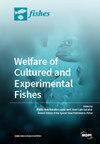A Characterization of the RNA Modification Response to Starvation under Low Temperatures in Large Yellow Croaker (Larimichthys crocea)
IF 2.1
3区 农林科学
Q2 FISHERIES
引用次数: 0
Abstract
Emerging evidence shows that N6-methyladenosine (m6A) is a post-transcriptional RNA modification that plays a vital role in regulation of gene expression, fundamental biological processes, and physiological functions. To explore the effect of starvation on m6A methylation modification in the liver of Larimichthys crocea (L. crocea) under low temperatures, the livers of L. crocea from cold and cold + fasting groups were subjected to MeRIP-seq and RNA-seq using the NovaSeq 6000 platform. Compared to the cryogenic group, the expression of RNA methyltransferases mettl3 and mettl14 was upregulated, whereas that of demethylase fto and alkbh5 was downregulated in the starved cryogenic group. A Kyoto Encyclopedia of Genes and Genomes pathway enrichment analysis showed that the differentially m6A-modified genes were mainly enriched in steroid biosynthesis, DNA replication, ribosome biogenesis in eukaryotes, PPAR, ECM-receptor interaction, lysine degradation, phosphatidylinositol, and the MAPK signaling pathway, suggesting that L. crocea responds to starvation under low-temperature stress through m6A methylation modification-mediated cell growth, proliferation, innate immunity, and the maintenance of lipid homeostasis. This study advances understanding of the physiological response mechanism exerted by m6A methylation modification in starved L. crocea at low temperatures.低温条件下大黄鱼(Larimichthys crocea)对饥饿的 RNA 修改反应特征
新的证据表明,N6-甲基腺苷(m6A)是一种转录后 RNA 修饰,在调控基因表达、基本生物过程和生理功能方面发挥着重要作用。为了探讨低温饥饿对大黄鱼肝脏中m6A甲基化修饰的影响,研究人员利用NovaSeq 6000平台对低温组和低温+禁食组的大黄鱼肝脏进行了MeRIP-seq和RNA-seq分析。结果表明,与低温组相比,低温饥饿组 RNA 甲基转移酶 mettl3 和 mettl14 的表达上调,而去甲基化酶 fto 和 alkbh5 的表达下调。京都基因和基因组百科全书》的通路富集分析表明,不同的 m6A 修饰基因主要富集在类固醇生物合成、DNA 复制、真核生物的核糖体生物发生、PPAR、ECM-受体相互作用、赖氨酸降解、磷脂酰肌醇和 MAPK 信号通路中,这表明羊角菜在饥饿条件下对饥饿做出了反应。m6A 甲基化修饰介导的细胞生长、增殖、先天性免疫和脂质平衡的维持来应对低温胁迫下的饥饿。这项研究加深了人们对低温饥饿黄花鱼 m6A 甲基化修饰生理响应机制的认识。
本文章由计算机程序翻译,如有差异,请以英文原文为准。
求助全文
约1分钟内获得全文
求助全文

 求助内容:
求助内容: 应助结果提醒方式:
应助结果提醒方式:


